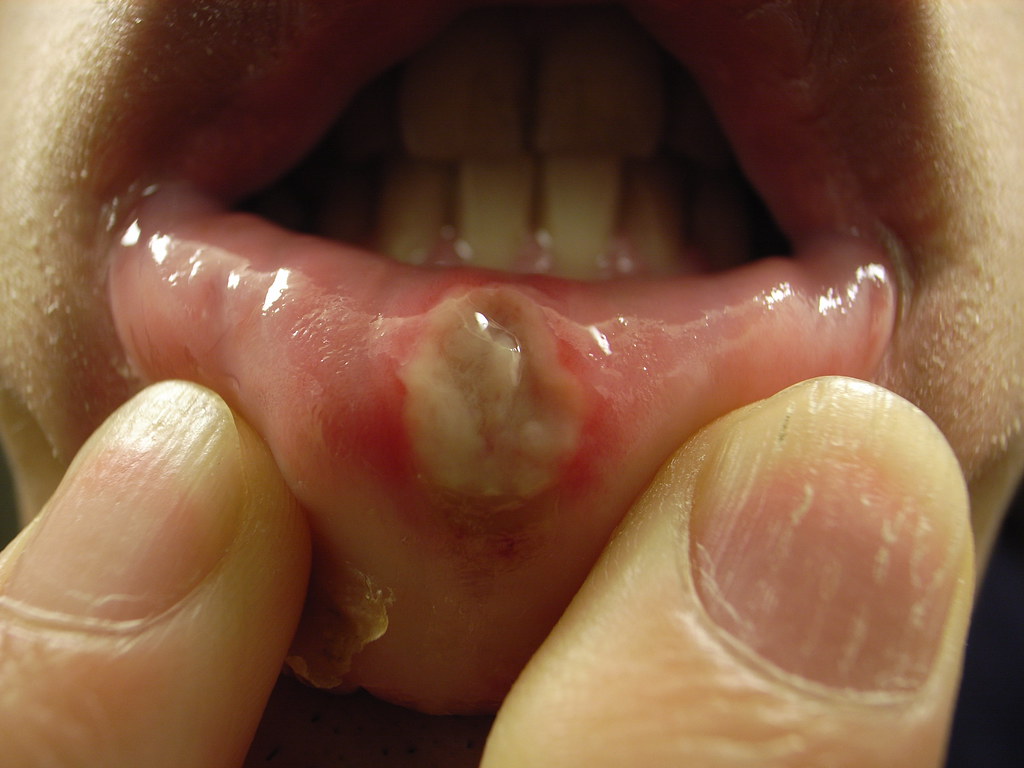 Certain dental conditions that aren’t extremely serious can make speaking and eating uncomfortable. They can even cause individuals to experience discomfort when their mouths and tongues aren’t even in motion. Perhaps one of the most common causes of mouth discomfort is canker sores.
Certain dental conditions that aren’t extremely serious can make speaking and eating uncomfortable. They can even cause individuals to experience discomfort when their mouths and tongues aren’t even in motion. Perhaps one of the most common causes of mouth discomfort is canker sores.
What Are Canker Sores?
Canker sores are basically small ulcers that come up in the mouth and provide discomfort. They might sting and ache, especially when the teeth or tongue come into contact with them. There are generally two types of canker sores: simple ones and complex ones. Simple ones are ones that only appear less than five times a year, whereas complex ones occur much more frequently. Usually, individuals between 10 and 20 years old experience simple canker sores, although this doesn’t mean that older adults can’t experience them as well. Usually, when older adults experience them, though, they experience complex ones and have a history of getting canker sores.
Causes of Canker Sores
Although the exact cause of canker sores is unknown, many dental experts believe that the condition is associated with stress or injury to the tissues within the mouth. Certain types of acidic foods can sometimes trigger canker sores or make them worse if a person already suffers from one. Examples of these types of foods include citrus like lemons and oranges. In other cases, canker sores can be caused by dental appliances like braces or dentures scraping the tissue inside the mouth. People who suffer from complex canker sores, though, usually have a more serious problem like an autoimmune disease, nutritional deficiencies or a gastrointestinal tract disease.
Cures for Canker Sores
 There is no one cure for canker sores. However, the pain associated with them can be treated and managed, and there are also preventative measures that individuals can take to help reduce the likelihood that they’ll develop another canker sore. Usually, no treatment is required for canker sores, and the pain will lessen on its own in a few days, and then within a week or two, the sore will absolve itself. However, people who experience complex canker sores might have more severe pain that is accompanied by a fever, and the sore might be more persistent, lasting more than a couple of weeks. In cases such as these, dentists can prescribe an antimicrobial mouth rinse, a corticosteroid ointment and other types of prescriptions to help manage the pain. Additionally, they might also recommend some over-the-counter medications. They might also suggest some preventative measures to help keep you from developing them again in the future. Some of those measures might include avoiding acidic foods that irritate the mouth, avoiding chewing gum and brushing with a soft-bristled toothbrush after every meal. Brushing after each meal and flossing daily can help keep the mouth free from any foods that can irritate the tissues in the mouth when they sit for a long period of time releasing acids into the tissues.
There is no one cure for canker sores. However, the pain associated with them can be treated and managed, and there are also preventative measures that individuals can take to help reduce the likelihood that they’ll develop another canker sore. Usually, no treatment is required for canker sores, and the pain will lessen on its own in a few days, and then within a week or two, the sore will absolve itself. However, people who experience complex canker sores might have more severe pain that is accompanied by a fever, and the sore might be more persistent, lasting more than a couple of weeks. In cases such as these, dentists can prescribe an antimicrobial mouth rinse, a corticosteroid ointment and other types of prescriptions to help manage the pain. Additionally, they might also recommend some over-the-counter medications. They might also suggest some preventative measures to help keep you from developing them again in the future. Some of those measures might include avoiding acidic foods that irritate the mouth, avoiding chewing gum and brushing with a soft-bristled toothbrush after every meal. Brushing after each meal and flossing daily can help keep the mouth free from any foods that can irritate the tissues in the mouth when they sit for a long period of time releasing acids into the tissues.
References:
American Academy of Family Physicians
11400 Tomahawk Creek Parkway
Leawood, KS 66211-2680
800-274-2237 or 913-906-6000
http://www.aafp.org/home.html
American Academy of Oral Medicine
23607 Hwy 99, Suite 2C
Edmonds, WA 98026
+1 425-778-6162
http://www.aaom.com/
Images:
https://farm3.staticflickr.com/2343/2422273581_df227ea2a6_b.jpg
https://farm6.staticflickr.com/5657/22784631323_1ed6ee35f5_b.jpg